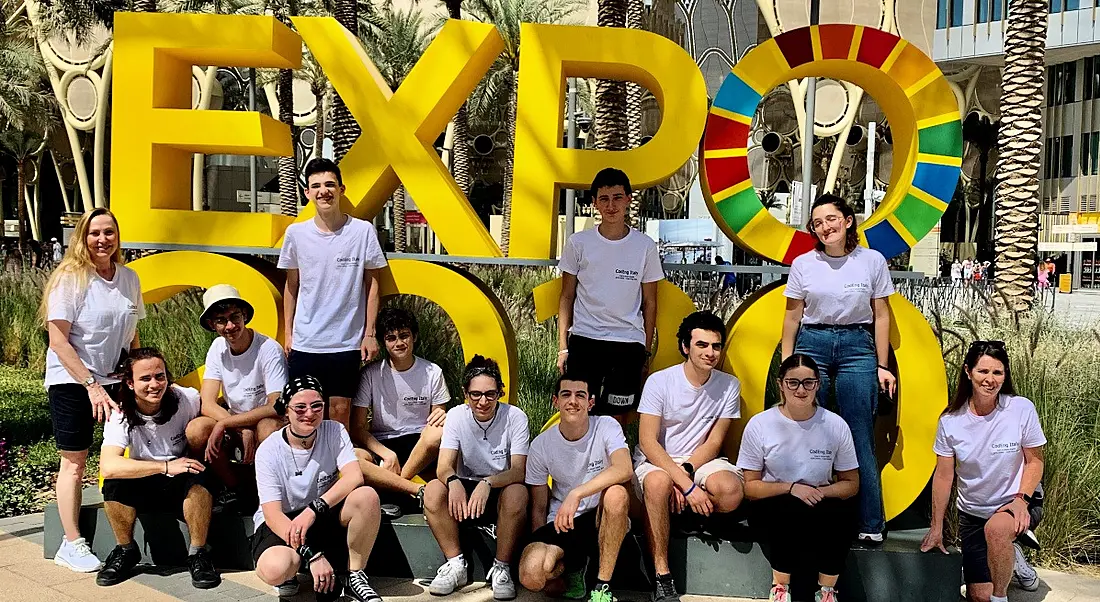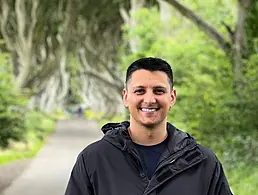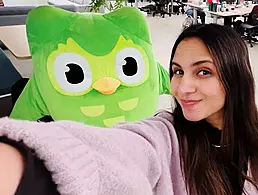Dublin native Derval O’Neill is on a mission to get young people excited about creating their own software through her CodEng coding camps.
When Derval O’Neill was asked by her 11-year-old son to come into his school and show his classmates how to build an app, she was bowled over by the children’s excitement.
“Their energy was infectious and I thought: ‘I want to teach tech to young people!’ A year later, during EU Code Week in October 2015, CodEng was founded and we held our first meetup in a café in Varese, northern Italy.”
CodEng promises to teach ‘code in simple English’, offering weekly coding lessons both during school hours and after school. The organisation also runs a number of code camps in Italy, the US and more recently in Dubai.
‘[Students] want to know how to build a Zelda-themed video game, understand how TikTok algorithms work or if Google AI is really sentient’
– DERVAL O’NEILL
Interestingly, O’Neill didn’t start off in the tech industry. After getting a degree in European studies at the University of Limerick and an MBA at Henley Business School, she held various positions such as European affairs officer for Bates & Wacker and trade affairs officer for Sony Electronics.
But about 13 years ago, while on maternity leave, she decided she wanted to know how to build apps and started exploring a platform called Buzztouch.
“Not coming from a computer science background, I wanted to have a better understanding about how to the write the code under the hood,” she explained.
“So I followed Stanford University’s programming methodologies course, a series of 28 tutorials on YouTube. While these tutorials are now 10 years old, they are, in my humble opinion, among the best free coding lessons you will find online today. This marked the beginning of my journey in learning computer science.”
On 25 July, CodEng coders depart Dublin and Milan for Silicon Valley for their next code camp. The group of 18 young tech enthusiasts come from Ireland, Italy and other parts of Europe. Included in the team is award-winning student Aoibheann Mangan who spoke at Inspirefest in 2018 about her passion for coding and STEM.
“During our visit to the Bay Area, we are being hosted by Google, Microsoft and Stanford University, to name but a few, with the objective of improving our coding skills and to learn more about the latest developments in the industry from AI to the metaverse,” said O’Neill.
“Each evening, our aspiring coders will attend coding sessions to learn how to develop an app on the iPad using Swift Playgrounds 4.”
Teaching through ‘edutainment’
O’Neill said one of the most unique aspects of CodEng is that its approach to teaching is based on ‘edutainment’ – the combination of education and entertainment.
“Since computer science and technology in general can often be perceived by young people as being somewhat dull and requiring a considerable knowledge of mathematics, they don’t even consider taking a class in it,” she said.
“By devising a curriculum which is fun and connects students with their existing knowledge of technology, the result is that they become engaged straight away. They want to know how to build a Zelda-themed video game, understand how TikTok algorithms work or if Google AI is really sentient.”
O’Neill said the second unique aspect of CodEng is that it gives young coders a window into the world where they can see real-life applications for what they’re studying.
“In June, CodEng had its first experience at Space Camp in Alabama where space enthusiasts learn to train as an astronaut, take part in simulated missions to Mars and get to speak to NASA scientists about plans to return to the moon and to eventually build a permanent base there.”
Next week’s camp will be the organisation’s fourth in Silicon Valley. O’Neill said coding camps like this one can help students believe that they can have a career in the industry if they want it.
CodEng at NASA astronaut training at Space Camp in Alabama. Image Derval O’Neill
“By creating a non-intimidating, fully immersive environment at a week-long code camp, these young people can start building their own websites, developing video games and acquiring an understanding of the industry as a whole. They come away feeling empowered and excited. As a teacher, this is a very rewarding process to witness.”
Ever since that first desire to teach tech to kids, O’Neill has come a long way too. Last year, she was selected by Stanford University to be a volunteer section leader to teach beginners Python online as part of the Code in Place initiative, which saw more than 12,000 students take part.
“For five weeks, each section leader taught a set curriculum to a group of 10 or more adults, hailing from all corners of the globe. Stanford professors and their support team provided section leaders with all the materials necessary to deliver the best possible learning experience to the students,” she said.
“As a section leader, it was a privilege to work alongside the best-in-class when it comes to teaching computer science. Since then, I have visited Stanford on a number of occasions and have met with the professors who have been very supportive of what we are doing at CodEng.”
Advice for young coders
For those who are interested in coding, O’Neill advised looking at the wide range of tech careers out there to get a feel for what the possibilities are.
“You could decide that you want to become a security analyst and focus on cybersecurity, or you may want to become a data analyst and learn how to collect and interpret datasets in order to solve a problem,” she said.
“You may want to explore the limitless possibilities of artificial intelligence or robotics. You could even set your sights on sending the next rocket to the moon or developing digital worlds which will form part of the future metaverse. The options are endless.”
CodEng students creating robots. Image Derval O’Neill
“Needless to say, all of these roles require some level of coding knowledge and as the saying goes: Talk is cheap. Show me the code!”
Whether you’re a teenager who wants to learn how to make video games using Python or an aspiring technologist who wants to see real-life applications, O’Neill said CodEng can help. “To sign up to weekly online classes or to know more about our international camps, you can email us at coding@codeng.eu.”
You can also follow CodEng’s Silicon Valley adventure on Instagram.
10 things you need to know direct to your inbox every weekday. Sign up for the Daily Brief, Silicon Republic’s digest of essential sci-tech news.




